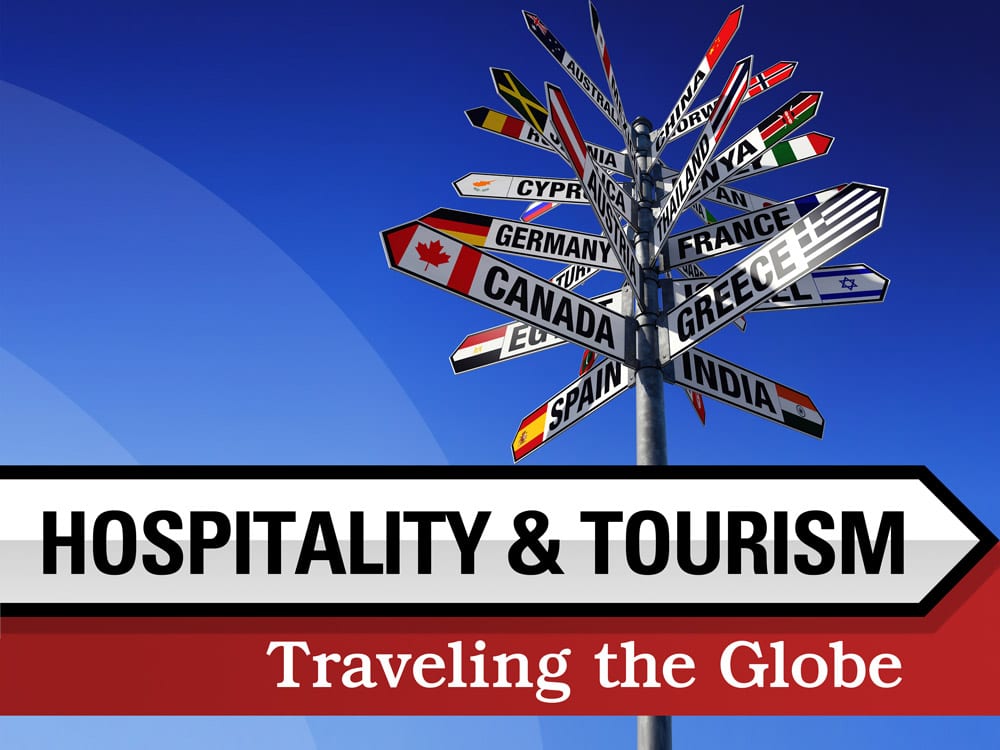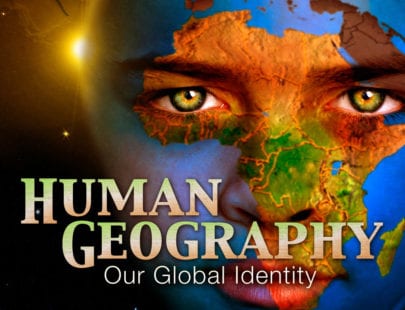
Hospitality & Tourism: Traveling the Globe
Where is your dream travel destination? Now imagine working there! You’ll be introduced to a thriving industry that caters to the needs of travelers through managing hotels, restaurants, cruise ships, resorts, theme parks, and any other kind of hospitality you can imagine. Operating busy tourist locations, creating marketing around leisure and travel, spotting trends, and planning events are just a few of the key aspects you will explore within this exciting field.
Units at a Glance
Unit 1: Introduction to Hospitality & Tourism
Do you like meeting new people? Do you find it enjoyable to help people? Do you like to travel and see different parts of the world? If so, you may be interested in a career in the hospitality and tourism industry. This unit will introduce the industry and the various types of businesses within it. We’ll learn more about the development and history of the hospitality and tourism industry, and we’ll also discuss some of the current trends affecting it today.
What will you learn in this unit?
- Assess why many people are attracted to careers in the hospitality and tourism industry
- Define the parameters and characteristics of the hospitality and tourism industry
- Examine the areas of business that make up the hospitality and tourism industry
- Trace the development of the hospitality and tourism industry
- Discuss the importance of service and the guest cycle in the industry
- Identify and discuss several current trends affecting the hospitality and tourism industry
Unit 2: Careers in the Hospitality and Tourism Field
Do you think you’d like to work in the hospitality and tourism industry? In this unit, we will examine some of the career areas available to people. We’ll learn more about career paths and what these typically look like in hospitality and tourism businesses. We’ll also discuss some of the characteristics that employers look for in employees and discuss some tips that people can use to obtain careers in hospitality- or tourism-related fields.
What will you learn in this unit?
- Define career paths and discuss how these affect the hospitality industry.
- Discuss the personal characteristics required in hospitality industry employees.
- Identify and discuss some of the career options in the hospitality and tourism industry.
- Examine the advantages and disadvantages of working in the hospitality industry.
- Discuss job benefit mixes and their role in the hospitality industry.
Unit 3: Hotels
Lodging is one of the earliest-known sectors of the hospitality and tourism industry. From ancient societies to modern times, people have needed places to stay and sleep when they are away from home. In this unit, we will explore the hotel sector of the hospitality and tourism industry, and we’ll learn about some of the different types of lodging. We’ll also discuss some of the common departments in hotels and what these departments are responsible for in the hotel’s operation. Finally, we’ll discuss room counts and the practice of overbooking rooms.
What will you learn in this unit?
- Describe different types of hotels, ownership structures, and the advantages and disadvantages of each
- Examine how most hotels are organized in terms of staff members
- Identify the tasks and responsibilities of departments such as housekeeping, security, and the front office
- Explore how room counts are generated and how payment services are now being handled by enhanced technology
- Discuss the practice of overbooking and its possible consequences
- Compare three types of marketing channels and examples of each in connection with hotels
Unit 4: Restaurants and Food Service
Convenience has become a hallmark of the modern world. Nowhere is this truer in the hospitality industry than with restaurants and other food service businesses. More than ever, people are eating outside their homes, whether this involves a short trip to a restaurant down the street or as part of a longer trip outside of someone’s local area. In this unit, we will examine the restaurant and food services sector of the hospitality and tourism industry. We will discuss some of the different types of restaurants, examine the front and back of the house, and investigate how restaurants differ from managed services.
What will you learn in this unit?
- Describe different types of food-related businesses.
- Define and understand the front of the house versus the back of the house.
- Discuss the functions of the front and back of the house.
- Examine the importance of menus in the operation of a restaurant.
- Consider how managed services differ from restaurants.
Unit 5: Tourism and Travel Planning
Since ancient times, people have been interested in seeing the world around them. Although our methods for travel have changed dramatically since then, many people still travel far away from their homes to see new places and experience different cultures. In this unit, we will examine some of the aspects of tourism and travel planning that make up this area of the hospitality and tourism industry. We will consider some of the factors that influence travel and the impact that travel can have on everyday life. We’ll also examine career options in the area of tourism and how these career positions are changing in today’s world.
What will you learn in this unit?
- Define tourism and identify the different types/aspects of tourism
- Explain the impact of tourism on a local, national, and global level
- Examine some of the factors that influence tourism decisions
- Discuss ecotourism and its place in the tourism industry
- Evaluate travel websites and different career positions in tourism promotion
Unit 6: Event Planning and Conventions/Exhibitions
Everyone likes to have a good time, but what about being the person behind all the action? If you like to help people make tough choices, organize, and are dedicated to customer service, this sector might be a good fit. Event planners and event managers are integral parts of the event business, helping to ensure that the gatherings they oversee run smoothly. However, these are careers in the hospitality and tourism industry that are often overlooked. Let’s take a peek!
What will you learn in this unit?
- Identify and compare some of the different types of meetings and events
- Summarize career areas in the field of event planning and the difference between an event planner and event manager
- Explain some of the steps in planning an event
- Describe some of the steps in marketing an event
- Discuss some of the tasks involved in managing an event
Unit 7: Theme Parks and Recreation
How do you unwind and relax? Today, we do many things to help us cope with the modern stressors that we face in areas like workplaces and school. This unit focuses on the recreation and leisure sector of the hospitality and tourism industry. We will learn about government-sponsored, nonprofit, and commercial recreation sites, and we will examine the history of the amusement park. We will also learn more about the responsibilities and challenges of managing an amusement or theme park.
What will you learn in this unit?
- Explain leisure and recreation and their place in modern society
- Compare for-profit and non-profit recreation sites
- Identify types of government-sponsored, non-profit, and commercial recreation
- Summarize the history of amusement and theme parks
- Discuss the role and responsibilities of amusement and theme park managers
Unit 8: Cruise Ships and Resorts
In some areas of the hospitality and tourism industry, guests are “captive” in the sense that they spend a great deal of their vacation on the premises of the hospitality and tourism business. Two examples of this are cruise ships and resorts. Both cater to a complete vacation experience for guests that can’t otherwise be replicated—long gone are the days of one-size-fits-all vacations. This has resulted in changes and challenges for owners, staff, and guests alike. Working through these challenges will allow the cruise and resort sectors to grow and grow, possibly bypassing all other areas of the hospitality and tourism industry.
What will you learn in this unit?
- Summarize the similarities and differences between cruise ships and ocean liners
- Compare and contrast different types of cruise ships and what they offer
- Understand cruise ship terminology and cabin choices
- Explain some of the changes and challenges cruise ships are facing
- Identify and describe some different types of resorts
- Discuss how resorts are handling common issues and challenges
Required Materials
Physical
- audio recording device (like a cell phone)
- video recording device (a camera phone, computer camera, or other kind of device capable of
- recording video and audio)
- various props from around the house for videos
Software
- slide presentation software
- word processing software
- online file storage like Google Drive
Other
- friend or family member volunteer



